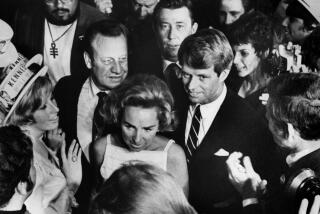The Fitzgeralds and the Kennedys: AN AMERICAN SAGA by Doris Kearns Goodwin (Simon & Schuster: $22.95; 864 pp.)
Americans have a national love affair with royalty. “Even as the people would reject a king,” John Kennedy said, “their hearts tugged for the symbols of royalty.” Our aversion for monarchical rule and titles of nobility are matched by a fascination with celebrities: self-made movie stars, sports heroes, television personalities and prominent politicians, rich and famous folks with whom most of us can identify. We relish both their success and their failings. We not only enjoy their eminence, we also take secret pleasure in their weaknesses, their inconstancies, divorces and financial misadventures.
No family in America more fully satisfies the national longing for royalty than the Kennedys. During John Kennedy’s first campaign for Congress in 1946, the family staged a huge formal rece1886677359”Who . . . ever heard of asking the voters to dress up to be presented to a candidate and his family as if they were royalty?,” one campaign worker asked. But the idea was a stunning success. Hundreds of women stood in a blocklong reception line that “swelled into the streets” and snarled traffic as they waited to meet the “first Irish Brahmins.” Rose Fitzgerald Kennedy, the daughter of John “Honey Fitz” Fitzgerald, a former congressman and mayor of Boston; Joe Kennedy, the self-made millionaire, and their large, attractive family mirrored dreams of success for America’s emerging ethnics. At Jack’s and Jacqueline’s wedding in 1953, almost 3,000 people broke through police lines outside the church in Newport, R.I., “nearly crushing the bride.”
The elevation of the Kennedys to the status of a royal family has led to an outpouring of articles and books on the entire clan. Doris Kearns Goodwin’s new study is now the best book on the subject. The author of an earlier penetrating biography of Lyndon B. Johnson, which largely rested on an extraordinary body of interviews she persuaded Johnson to give her, Kearns uses her considerable skills as a researcher and biographer to draw engaging portraits of the Fitzgeralds and the Kennedys. Discovering more than 150 cartons of previously unexamined Joe and Rose Kennedy papers, Goodwin turned this “biographer’s treasure” to excellent account. The papers not only provided fresh detail and scope but also enriched a series of interviews with Kennedy associates, friends and family members, including Rose Kennedy. By showing her letters “dating from the early 1900s, handwritten notes from all her various trips, and . . . entries from the diary she kept while her husband was ambassador to England,” Goodwin was able to resurrect “long buried memories which she generously, often excitedly, shared with me.”
The result is a book that adds to our interest in the Kennedys. It is an exercise in evenhanded realism. There are no heroes or villains in Goodwin’s study, only real people with great strengths and great weaknesses. Joseph Kennedy, “the founding father,” was a brilliant scoundrel. Endowed with an uncommon capacity to foresee economic and financial developments, he made a fortune in stocks, Hollywood films and liquor. “The key to Kennedy’s spectacular financial success,” one associate said, “was his anticipation of the future. . . . His vision of what lay down the road . . . was simply phenomenal.”
As ambassador to Britain, however, his capacity for discerning judgments entirely deserted him. Unable to free himself from an antipathy for American involvement in another European war, he preached appeasement of Hitler and the Nazis, even after Neville Chamberlain, the architect of that failed policy, had given up on the idea. The contradictions in the man extended to other areas as well. Wounded by people prejudiced against Irish Catholics, he was intolerant of Jews and other minorities. Deeply devoted to his family, he was a compulsive womanizer whose affairs were an open secret.
Like his father, Jack Kennedy was a bundle of contradictions. Although strongly drawn to the symbolic trappings of his religion, he lived with deep-seated doubts about his faith. A great admirer of principled political leadership, as demonstrated in his book, “Profiles in Courage,” he refused to take bold stands on issues during his pre-presidential career. A man with an exceptional capacity for self-control, as evidenced by his lifelong struggle with the consequences of Addison’s disease and excruciating back pains that required repeated major surgeries, he could not rein in his sexual appetites. During his early congressional days, one friend and fellow congressman recalled, he spent “more of his time and energy on his women . . . than he did on his congressional duties.” Even after his marriage, the depth of his “need for other women” sometimes left Jackie “stranded at parties while Jack would suddenly disappear with some pretty young girl.”
What makes Goodwin’s book so successful is her capacity to tell a fascinating story with compassion and understanding. Her book, as the English say, is a very good read. But beyond that, it is the Fitzgeralds and the Kennedys themselves who command our attention. Their story, the rise of Boston Irish immigrants from poverty to riches and international fame will amuse, anger and sadden you. It is the tale of misery, ruthless ambition, crudeness and courage in the face of terrible adversity. It is an American saga in which we see the best and the worst in our national life.
More to Read
Sign up for our Book Club newsletter
Get the latest news, events and more from the Los Angeles Times Book Club, and help us get L.A. reading and talking.
You may occasionally receive promotional content from the Los Angeles Times.









